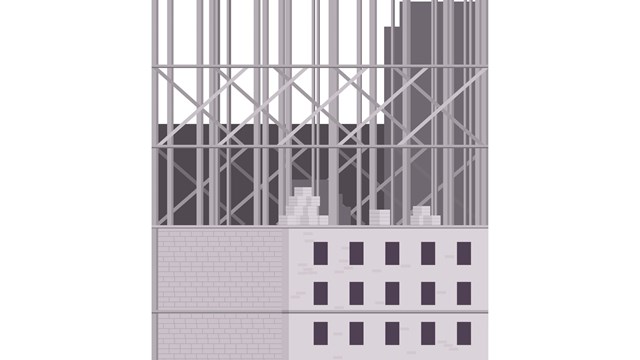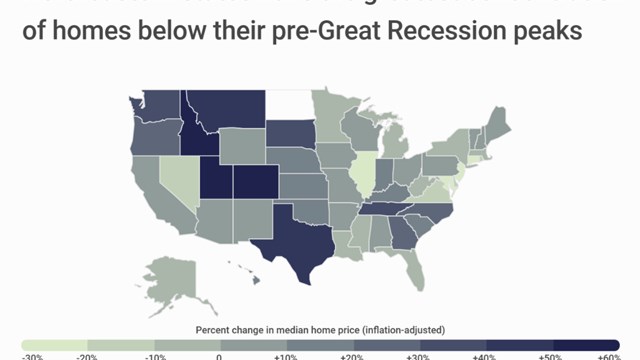
For almost a year now, we have been hearing more and more about the subprime mortgage crisis. Subprime mortgages are mortgages that banks sell to borrowers whose problematic credit ratings do not allow them to get mortgages at better rates.
Many of the subprime mortgages were adjustable-rate mortgages, which are lower-cost than fixed-rate, but where the buyer has in effect agreed to take on a risk of paying higher interest rates in return for lower payments. Many of these loans were given high credit ratings, regardless of the risk involved.
Nationwide, as rising interest rates increased the monthly payments on these mortgages and property values suffered declines, several major subprime mortgage lenders were forced to shut down or file for bankruptcy. Many observers have blamed the crisis on banks who sold large numbers of subprime mortgages in "bundles" to investors.
Real estate in the New York City area has fared better than it has nationwide—new buildings are still being constructed, prices for co-ops and condos are still high. Attorney Steven Ganfer, whose Manhattan-based law firm Ganfer & Shore LLP representsmore than 100 buildings as general counsel, says, "If you're a 150-unit building, it doesn't make a lot of difference if you lose an apartment or two."
Still, according to a recent article in the New York Sun (http: //www.nysun.com/article/63950), the crisis has had ripples throughout the New York financial industry—Morgan Stanley announced cuts of 600 mortgage jobs; Bear Stearns has announced cuts of 310 mortgage jobs.
In August, American Home Mortgage Inc., headquartered in Melville, Long Island saw its stock plunge 90 percent. Soon afterward, the company laid off most of its staff, announced it could no longer fund home loans, and then filed for bankruptcy. And in late October, Senator Charles Schumer predicted that the subprime mortgage crisis would lead to nearly 15,000 home foreclosures across the five boroughs.
How is this related to your condo or co-op? Mona Shyman, vice president of the Federation of New York Housing Cooperatives and Condominiums (FNYHC) says, "I don't know how this has affected the buildings, but the biggest things are the sale of apartments." In the past, she says, if an applicant for an apartment had a low income but a lot of money in the bank, many boards would approve that person. But nowadays, boards may be taking a second look.
Also, she says, "Down the line, as people's mortgages come due and rates are higher, what happens when people can't pay both their mortgages and their maintenance charges?" Other people, she added, "are selling homes, but can't find buyers."
Lewis Taishoff of the Manhattan law firm of Schechter & Brucker PC, an attorney who represents several condo and co-op boards and has been in the field for about 40 years, believes that "Manhattan is a special case. It has had much less of an impact here—it's much more high-end. But there's certainly a climate of concern. Even though the evidence so far is anecdotal, certainly everyone is aware of it."
Board Requirements
So given the volatility of the mortgage landscape at the moment, is it more difficult now for potential buyers to pass condo and co-op boards' requirements, in general?
Opinions vary. Shyman believes that boards' financial requirements haven't been changing. There are other factors putting the squeeze on boards, such as rising water bills and insurance rates, she points out—it's not only mortgages.
Taishoff, however, says, "From my very limited experience, definitely yes. A lot of people are looking more closely at applications. There has been, if I may say, a certain locking of the barn door after the horse was stolen," although, he adds, "most of the bad loans have been made already."
Eric Goidel, an attorney with Borah, Goldstein, Altschuler, Nahins & Goidel in Manhattan says he has "not seen anything different. Most of the boards we represent are not rubber stamps for lenders." Boards, he adds, should have their own credit criteria and lending limits—even if a subprime lender has given the potential buyer a loan commitment.
"A person should only be allowed to borrow so much; 70 or 80 percent of market value, where buyers with subprime loans may have been able to borrow 100 percent [of the price]," he adds. "Those boards who do their homework and do their own credit checks are avoiding these problems."
In Manhattan, adds Ganfer, "We're not seeing big changes in the boards. In the co-ops, most of them require at least 20 percent down."
Unit Owners
With the jury still somewhat out on whether boards are beginning to tighten their requirements, are there ways in which current shareholders and unit owners been affected by the subprime meltdown?
It would appear that the answer is yes—at least in theory. According to Goidel, those who may have taken out subprime loans to purchase their apartments and have to refinance their loans are finding themselves looking at higher interest rates.
If they borrowed an amount near 100 percent of market value, a small downturn in the real estate market may put them "underwater," says Goidel, leaving them with an apartment with diminished value and an inability to borrow more money.
"For example," he says, "someone borrows $100,000, and that's almost 100 percent of market value. The apartment is now worth $90,000. He wants to refinance—where does the additional money come from?"
In contrast, Ganfer says that "some of the people who have been purchasing some of the lower-end apartments are concerned about their ability to get financing, but they have been getting financing."
No Rash of Defaults—Yet
As we've mentioned, with subprime mortgages and rising interest rates, some people on low or fixed incomes may find themselves having to choose between making mortgage payments and making monthly maintenance payments. No one is reporting a huge rash of foreclosures yet, particularly not in Manhattan and parts of Brooklyn where borrowers are more likely to qualify for more favorable loans.
When they do happen however, foreclosures can be a messy business. For example, co-op foreclosures have to be initiated by the board. Also, because co-op units are not considered real property, co-op foreclosures do not have to go through the court, and instead will go to auction, a process difficult for most lay people to understand.
Let us suppose there has been some fallout from the mortgage crisis—such as empty units and missed fees in a mid-sized, middle-income co-op building. How might the board deal with it?
"In some of our buildings," says Ganfer, "we've been trying to start proceedings [on apartments whose owners have defaulted] independent of the foreclosure process because foreclosures take a long period of time. If you do them independently, you may get your judgment before the bank gets theirs."
Still, overall, Ganfer hasn't seen a large number of defaults. "The market has really held here," he said.
One reason that fallout hasn't really happened, at least yet, is the Aztec (sometimes spelled Aztech) Recognition Agreement in co-ops. (The form gets its name from the company that produces it, not the indigenous culture of Mexico.)
The Aztec Recognition Agreement is the document that the bank draws up to give its lien the first priority over the co-op's lien in case the shareholder defaults. Also, the co-op corporation promises to notify the lender if the owner fails to pay maintenance or other fees to the co-op.
As part of this agreement, says Shyman, "The mortgage holder will pay maintenance and repossess the apartment. If people don't pay their maintenance, the mortgage lender will pay after a while." Thus, the building is safe as long as people have a mortgage, she says.
Lenders Tightening Up Requirements
How are the banks reacting to the subprime mortgage fallout? Shyman says they are becoming much stricter with commitment letters for co-op and condo shareholders or owners. Ganfer says they're tightening up their appraisals and requiring more of a down payment from potential buyers.
"The only thing I would say is that lenders have toughened some of their lending requirements. Perhaps some have raised their credit score requirements. They won't lend to people below a certain score. They've gotten their appraisers to be a little stricter," says Goidel. "The lenders that remain are charging premiums for their risks—they want to protect themselves."
As this article is being written, some of the alarm about the situation has lessened, at least in the media—in the early part of last year, newspapers from as far away as New Zealand were warning of catastrophe around the corner. Still, professionals involved in the world of co-ops and condos, not to mention residents, should still be wary.
"Because of the liquidity, we [real estate professionals] don't have a stock ticker to look at," says Taishoff. "It's not like tracking the price of Microsoft. I work in the Empire State Building. We tell a joke—a man jumped off the top floor. As he passed the fiftieth floor, he said, 'I'm doing fine so far!' So my view is that it's a bit early to tell. When things went to pot in the early 1990s, there was already rumbling in 1988 or '89, but we didn't reach bottom for four years." Taishoff adds that in the early 1990s New York City witnessed a housing slump, a growth in foreclosures and a concern about problematic loans—and look what happened after that.
So what's the bottom line? Real estate markets and economies tend to be cyclical but New York City has always seemed to weather whatever storms come its way.
Raanan Geberer is a freelance writer and editor living in New York City.









Leave a Comment